The Edinburgh Review, July, 1865. The Quarterly Review, July, 1865.
—There is a curious parallelism in the subjects of the papers which make up our two principal Quarterlies, which shows very plainly how fixed and uniform a groove they have fallen into. Each has an elec- tioneering article, each a biographical article—" Watson's Life of War- burton " balancing " Carlyle's Frederic the Great." A paper on "Idiot Asylums " in the Edinburgh just matches one of " Metropolitan Sanitary Reform " in the Quarterly. The Quarterly on " Browning's Poems" pairs with_the Edinburgh on "Mr. Swinburne's Atalanta in Calydon." he f.obbedilates on " China and Japan," the former on " Arctic Ex- itortifion." "Lady Duff Gordon's Letters from Egypt " give occasion for a light paper on the "Social Condition of Egypt," and " Grouse " do similar service to the Quarterly by introducing an account of the change worked in Scotland by the system of letting the shootings for exorbitant rents. To make up the list, each review has a part-political part-re- ligious essay—the Edinburgh's having most religion, and the Quarterly's most politics, and each another paper on the "Antiquities of Italian Art." In neither review is there a single bad paper, nor a single one which any one would care to read a second time. The object seems to be to give a solid resume of the subject treated of, so that " society " may be able to talk about it just as well from reading the review as from plodding through some half-dozen books, blue or other- wise. The knowledge gained may be superficial, but if it will enable " society " to conceal its ignorance in conversation, what does that matter? This, combined with the steady, unchanging elements of the bill of fare—which may be predicted as certainly as the roast fowls and boiled lamb, or roast lamb and boiled fowls of our dinner-tables—is probably the reason why the Quarterlies nowadays are so steadily read, and yet excite so little interest. Certainly younger periodicals of a similar character, written with far greater brilliancy, have failed, or do not succeed in infringing on the monopoly of the two established critical authorities. But the English are a conservative race even in their reading, and besides prefer information to epigrams. The latter some- times compel a man to think, or even disturb his convictions. Of the " informing " article perhaps none in the Edinburgh is better than the account of the great tunnel through the Alps near Mont Collis, which is clear and, considering the subject, even light. The criticism on Mr. Swinburne's poem, too, is kindly and encouraging, and does full justice to the first important work of a rising poet, whose merits we early recog- nized, and many of whose shorter poems have from time to time appeared in this journal. Mr. Swinburne's fault is unquestionably a luxuriance of imagery, which sometimes conceals and even looks like a substitute for thought. This, however, examination will soon convince an intelligent reader that it is not, and it is a fault which time, and experience, and culture are pretty sure to remove. The extracts given in the paper on Lady Duff Gordon's letters have inspired us with A desire to read the work itself, a result not often produced, nor, as we have hinted, often perhaps aimed at by reviewers. The Quarterly has, we are glad to see, set itself to stem the tide of criticism, which has of late been running strongly against Mr Browning's fame. The faults found with him, his obscurity and harshness of versification, are just enough, but a volume of poems may be extracted from his works of really first-class merit, and it is, we think, more just to dwell exclusively on these last as the Quar- terly does, than on the faults, as reviewers in general have been apt to do. After all, the fame of all but three or four of the very greatest —15 rests on a few of their best works. Besides a warm plea in favour ine.„11,1Ler expedition towards the North Pole, there are political papers 1 kind, representing that the extension of the suffrage threat- ens property ; that the clergy ought to become political agitators‘i'? save their endowments, and especially to vote against Mr. Gladstone ; 'ishat the Broad-Church party desires not merely to abolish some of the exilft- ing tests of orthodoxy, but all of them, and have a Church " purged of dogma, disembarrassed of belief; embracing every error and crotchet ;" and a few other charitable propositions of the same sort.






























 Previous page
Previous page